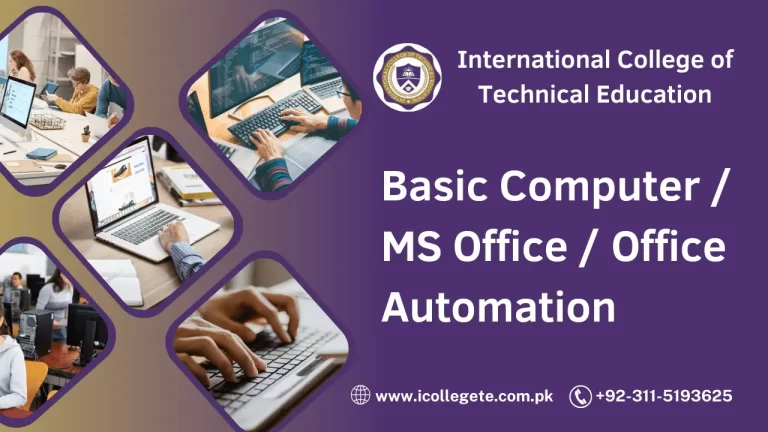In today’s fast-paced, interconnected world, effective logistics and supply chain management are crucial to ensuring the smooth flow of goods and services across the globe. Rawalpindi, with its growing business landscape, offers an ideal platform for professionals to enhance their skills in this essential field. The Logistics and Supply Chain Management (LSCM) course in Rawalpindi provides a comprehensive foundation for understanding the complexities of supply chains, logistics strategies, and operations management.
The Logistics and Supply Chain Management course in Rawalpindi is designed to provide students and professionals with an in-depth understanding of the modern supply chain process, including logistics, procurement, warehousing, and distribution. This course focuses on practical strategies and solutions to optimize supply chain operations, reduce costs, and improve overall efficiency.
Participants will gain the knowledge needed to address challenges faced in the global supply chain network, focusing on best practices, technology integration, and sustainable solutions. Upon completion, individuals will be equipped with the skills to streamline processes, improve customer satisfaction, and enhance their organization’s competitiveness.
Course Overview
This course offers an in-depth exploration of logistics and supply chain management principles, key components, and strategies used in the industry. Topics include procurement, inventory control, transportation management, warehouse operations, and the use of technology in optimizing supply chain functions. The course is designed to give participants both theoretical knowledge and hands-on experience in managing the complexities of global supply chains.
Key Topics Covered:
- Introduction to Logistics and Supply Chain Management: Understand the basic concepts, definitions, and the role of logistics in supply chain management.
- Procurement and Sourcing: Learn how to manage procurement processes, vendor relationships, and sourcing strategies.
- Inventory Management: Techniques for effective inventory control, demand forecasting, and stock optimization.
- Transportation Management: Understand the importance of transportation in logistics, including route planning, carrier selection, and freight management.
- Warehousing and Distribution: Explore warehousing processes, layout design, and efficient inventory handling strategies.
- Supply Chain Technology: An introduction to the software, tools, and innovations that are transforming logistics and supply chain operations.
- Sustainability in Supply Chain Management: Learn about sustainable practices and how to incorporate green logistics into your supply chain strategies.
Learning Outcomes
Upon completing the Logistics and Supply Chain Management course in Rawalpindi, participants will be able to:
- Understand the Core Concepts: Grasp key concepts in logistics and supply chain management, including procurement, transportation, warehousing, and inventory management.
- Optimize Operations: Develop skills to streamline supply chain operations and reduce inefficiencies to save costs.
- Analyze Supply Chain Networks: Gain the ability to analyze, model, and optimize supply chain networks to meet organizational goals.
- Leverage Technology: Understand and use modern technologies to improve logistics operations, such as Enterprise Resource Planning (ERP) systems and Warehouse Management Systems (WMS).
- Implement Sustainable Practices: Apply green logistics practices to reduce environmental impact while improving supply chain performance.
- Improve Customer Service: Learn how to improve customer satisfaction by optimizing delivery times, product availability, and service levels.
Study Units
The Logistics and Supply Chain Management course is divided into the following study units:
- Unit 1: Introduction to Logistics and Supply Chain Management
- Definitions, key concepts, and components of logistics and supply chain.
- The role of logistics in global trade and business.
- Unit 2: Procurement and Sourcing
- Procurement strategies, supplier selection, and relationship management.
- Sourcing products and services efficiently and cost-effectively.
- Unit 3: Inventory and Warehouse Management
- Inventory control techniques (ABC analysis, JIT, EOQ).
- Warehouse layout design, inventory handling, and order fulfillment.
- Unit 4: Transportation and Distribution
- Transportation modes, route optimization, and cost-effective transportation strategies.
- Distribution management, including last-mile delivery challenges.
- Unit 5: Technology in Logistics and Supply Chain
- Role of technology in logistics: ERP systems, GPS tracking, and automation tools.
- Digital transformation and the future of supply chains.
- Unit 6: Sustainability and Green Logistics
- Strategies for sustainable supply chains.
- Environmental concerns, energy-efficient practices, and reducing carbon footprints in logistics.
- Unit 7: Risk Management in Supply Chain
- Identifying risks in the supply chain and developing contingency plans.
- Managing disruptions and crises in global supply networks.
Course Benefits
The Logistics and Supply Chain Management course offers numerous benefits to participants:
- Increased Employability: The course provides highly sought-after skills in logistics, procurement, and supply chain management, opening doors to career opportunities in various industries.
- Enhanced Efficiency: Learn strategies to optimize logistics and supply chain operations, leading to significant cost savings and improved productivity for businesses.
- Practical Knowledge: The course offers a hands-on learning approach, using case studies and real-world examples to develop practical solutions for supply chain challenges.
- Sustainability Focus: As companies increasingly prioritize environmental sustainability, this course provides insights into how logistics can reduce carbon footprints and integrate green practices into the supply chain.
- Technological Expertise: Participants will learn about the latest tools and technologies used in the logistics and supply chain sector, preparing them for future advancements in the field.
Who is This Course For?
The Logistics and Supply Chain Management course in Rawalpindi is ideal for a wide range of professionals and individuals looking to advance or start their career in logistics and supply chain management. This course is for:
- Aspiring Supply Chain Managers: Those looking to pursue a career in managing supply chains across industries.
- Logistics Professionals: Individuals already working in logistics who want to deepen their knowledge of supply chain strategies and technologies.
- Procurement Specialists: Professionals involved in sourcing and purchasing who wish to understand the broader supply chain context.
- Business Owners and Entrepreneurs: Individuals running small or medium-sized enterprises (SMEs) looking to optimize their logistics and supply chain operations.
- Recent Graduates: Individuals with a background in business, engineering, or management looking to specialize in supply chain management.
- Warehouse and Distribution Managers: Those managing inventory, distribution networks, and warehouse operations.
The Logistics and Supply Chain Management course in Rawalpindi is an excellent choice for anyone interested in gaining specialized knowledge in logistics, procurement, and supply chain operations. With its comprehensive curriculum and practical approach, the course is designed to help participants develop skills that are highly valued in today’s competitive business environment. Whether you’re a professional looking to advance your career or an entrepreneur seeking to optimize your business operations, this course will provide the tools you need to succeed in the dynamic world of logistics and supply chain management.







